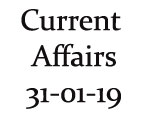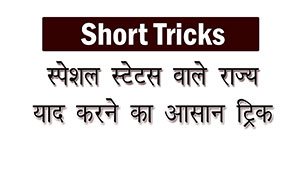-
Current Affairs 31st January 2019
Updated : 31-Jan-2019
Current Affairs 31st January 2019 - Important Points
- PM Modi inaugurated National Salt Satyagraha Memorial on - 30th January 2019
- Corruption Perceptions Index 2018 released on - 29th January 2019
- Africa Centre for Climate & Sustainable Development initiated at - Rome
- Attaining the Sustainable Development Goals by - Africa
- Punit Goenka named as new chairman of - BARC India
- International Year of the Period Table of Chemical Elements announced by - UNESCO
Current Affairs 31st January 2019 - Details
PM Modi inaugurated National Salt Satyagraha Memorial on - 30th January 2019
Prime Minister Narendra Modi dedicated the National Salt Satyagraha Memorial at Dandi in Navsari district, Gujarat to the nation on 30th January 2019 on the occasion of Mahatma Gandhi’s 71st death anniversary.
The Prime Minister also unveiled at the memorial site, the statues of Mahatma Gandhi and 80 Satyagrahis who had marched with him during the historic Dandi Salt March to make salt from sea water against the British law in 1930.
Important Highlights- The memorial has 24-narrative murals which depicts various stories and events from the historic 1930 Dandi March.
- Other than that, solar trees are also installed around the site in order to meet the energy requirements of the memorial complex.
- The main motto of this memorial is to serve as a reminder of the great sacrifices made by the people of the nation for the freedom cause.
- It is a tribute to the Satyagrahis led by Gandhi Ji, who worked for India’s freedom and simultaneously is expected to be a major attraction for the tourists.
- The memorial encapsulates the ideals of Mahatma Gandhi- Agrah for Swatchagrah, Swadeshi and Satyagraha.
Did you know?
The Government has declared 7th August to be celebrated as Handlooms Day, every year in order to promote handlooms.
Corruption Perceptions Index 2018 released on - 29th January 2019
Corruption Perceptions Index of Transparency International ranks nations & territories grounded on how corrupt a nation’s public sector & judiciary are professed to be by specialists & business executives.
It is the most widely utilised indicator of corruption around the world & it does not consider corruption in the business sector. The corruption perception index draws on 13 reviews & skilful assessments to measure public sector corruption in 180 nations & territories.
The scores indicate the apparent level of public sector corruption on a scale of 0-100. A score of 0 points that a nation is perceived as highly corrupt & a 100 points that a nation has sound integrity systems.
India’s Position- India’s position has been marginally improved 41 from 40 in 2017.
- India’s position increased from 81st in 2017 to 78th in 2018. India had slipped down from 79th rank in 2016.
- The report cities nations including India along with Malaysia, Maldives & Pakistan will be significant to watch moving forward.
- The report records that all these nations stated above have witnessed massive public mobilisation
against corruption coupled with significant political participation & voter turnout ensuing in new
governments that assured extensive anti-corruption reforms. - The report references that these encouraging expansions are yet to show some tangible solid action, particularly when it comes to combating elusive forms of grand corruption.
- The report noted that since India gears-up for general elections, there was a little important movement in its Corruption Perceptions Index score, which moved from 40th in 2017 to 41st in 2018.
- The report notes that in-spite of spectacular public mobilisation in 2011, where residents necessitated the government to take action against corruption & support for the passage of the comprehensive Jan Lokpal bill, with little to no movement on the basis to develop the specialist anti-corruption infrastructure needed.
Africa Centre for Climate & Sustainable Development initiated at - Rome
The Africa Centre for Climate & Sustainable Development was initiated by the Italian PM Giuseppe Conte at Rome. The centre has been initiated by the Italian government in connotation with the UN Development Program & the Food & Agricultural Organisation.
More about the Centre- The centre’s origin can be outlined to a declaration permitted by the G-7 meeting of the Environment Ministers in 2017.
- The centre would ease co-ordination among the G-7 & African nations on common initiatives in Africa to attain the goals formed by the Paris Agreement & the 2030 Agenda.
- The Centre would effort towards addressing the desires of Africa by delivering a platform for G-7 nations to steer their co-operation to contrast environmental degradation & encourage sustainable economic growth in the region.
- The centre will deliver a fast-track, demand-driven process for African nations to access grant resources that support policies, initiatives, & best practices on climate change, food security, access to water, clean energy, & accelerating progress on the Sustainable Development Goals in Africa.
- The centre would be hosted by United Nations Development Programme which would use its extensive nation office network & programmatic hubs, & global expertise & knowledge, to enable the African nations to access the resources available through it.
Attaining the Sustainable Development Goals by - Africa
Africa referred to as Dark Continent still has up to 330 million of its population residing in poverty & up
to 60 percent of unemployed Africans are youngsters. The centre will benefit to speed-up progress &
quickly resource national development primacies in the African nations to address these challenges & achieve the Sustainable Development Goals.Punit Goenka named as new chairman of - BARC India
The Broadcast Audience Research Council of India has selected Punit Goenka MD & CEO of Zee
Entertainment Enterprises Limited as the Chairman. Punit Goenka as a founder Chairman of Broadcast
Audience Research Council had played a crucial role in institutionalizing Broadcast Audience Research
Council.Broadcast Audience Research Council of India
- BARC India, is a cooperative Industry Company originated in 2010 by shareholder bodies that represent Broadcasters, Advertisers, & Advertising & Media Companies.
- The promoters of Broadcast Audience Research Council India are Indian Broadcasting Foundation,
Indian Society of Advertisers & Advertising Agencies Association of India. - Broadcast Audience Research Council India was formed according to the strategies of the Ministry of Information & Broadcasting, Government of India.
- Broadcast Audience Research Council India has evolved a transparent, accurate, & inclusive TV audience measurement system on the groundwork of robust & future-ready technology backbone.
- Together with the audience measurement system, Broadcast Audience Research Council India provides a suite of Insight products intended for Broadcasters, Advertisers & Agencies.
- The information produced & the insights provided by Broadcast Audience Research Council India
benefits in making efficient decision making by the shareholders. - Broadcast Audience Research Council India analyses the viewership habits of more than 197 million TV households. This makes it the world’s mega television audience measurement service.
- Broadcast Audience Research Council India’s measurement system is grounded on the sample of 44000-panel homes.
International Year of the Period Table of Chemical Elements announced by - UNESCO
UNESCO has announced 2019 as the International Year of the Period Table of Chemical Elements to
honour the 150th birth anniversary of the periodic table of chemical elements. The Periodic table of the
Chemical elements was 1st printed by Russian scientist Dmitry Mendeleev in the year 1869.
Periodic Table
The Periodic Table of Chemical Elements is the tabular preparation of the chemical elements, settled
by atomic number, electron configuration, & recurring chemical properties. The significant features of the periodic table are:
The 7 rows of the table are known as periods & generally lodge metals on the left & non-metals on the right side.
The columns of the table are known as groups & comprise elements with same chemical behaviours.
The elements from atomic numbers 1 to 118 have been revealed in nature/synthesized in laboratories.The 1st 98 elements registered in the periodic table occur naturally, though few are found only in trace
amounts &a few were revealed in nature only after having 1st been synthesized.
Elements from 99 to 118 have only been produced in laboratories/nuclear reactors.
Efforts are on to elements having higher atomic numbers, these elements would start the 8th row, &
theoretical work has been completed to propose possible candidates for this extension.














